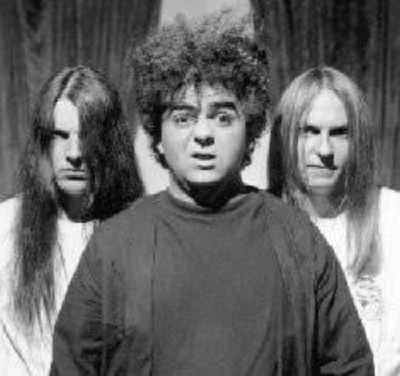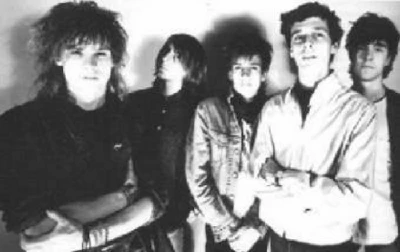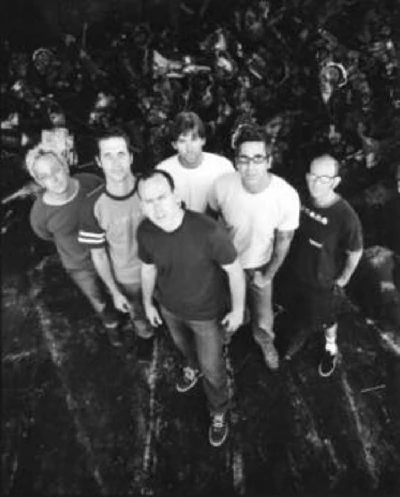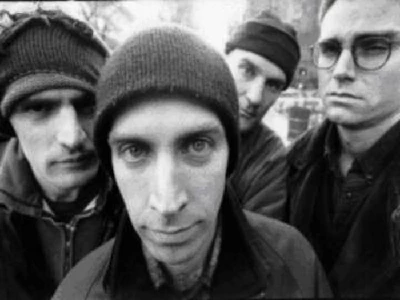Miscellaneous
-
Part 2-Punk Learns How to Play 1984-1994
published: 17 /
2 /
2003
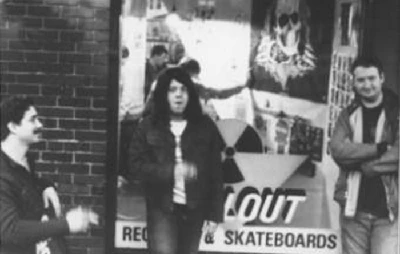
In the second in his series on the American hardcore movement, Mark Rowland examines the years between 1984 and 1994, and the impact of bands such as Husker Du, Bad Religion, the Jesus Lizard and Fugazi
Article
By the mid 80's, many of the original hardcore bands had split up. The kids in those bands grew up and got real jobs. For those hardcore kids that continued to play in bands, things started to change.These kids were no longer interested in making ultra-fast, thrashy punk songs. A lot of bands slowed down their pace, and brought in other influences to their music. These new influences showed just how creative and intelligent the hardcore scene had become.
Husker Du
Husker Du were one of the first hardcore bands to change and develop their sound. Starting off at the beginning of the hardcore movement, their early releases were pretty standard three chord fast punk. With the release of 'Zen Arcade'in 1984, however, the band started to embrace a more melodic approach. They developed this over their subsequent albums 'New Day Rising' and 'Flip your Wig',both of which came out in 1985, but their sound really came together perfectly on 1986's 'Candy Apple Grey'. More abrasive moments like 'Crystal'shared album space with acoustic numbers 'Too Far Down' and 'Hardly Getting over It' ; the energetic 'Don't Want to Know if You are Lonely', 'I Don't Know for Sure' and 'Eiffel Tower High', and even organ driven tracks like 'Sorry Somehow'. This punk with pop and even slightly soulful elements influenced many bands to come, including Nirvana and pretty much every Emo band ever (The band did a lot of emoting). After one last album, 'Warehouse: Songs and Stories', which came out in 1987 and was one of the few flawless double albums ever written, Husker Du called it a day, though they're still hugely influential.
Melvins/Green River
At around about the same time as Husker Du was walking thepop-rock path, other bands took a very different approach. In the state of Washington, two hardcore bands were starting to get a good following. These bands were The Melvins and Green River. They were both initially hardcore bands,influenced by bands like Black Flag and Minor Threat, but started to get fed up with the more moronic members of their audiences, so to anger them started slowing down their sound and adding metal elements to their music. They were early proto-types for the Grunge sound.
Bad Religion
Not all bands changed their sound radically though. When one of
the original hardcore bands, Bad Religion, returned with 'Suffer' in 1988 after along hiatus, their sound was still very punk. What they had developed,however, was a greater sense of melody, and a more articulate style ofsocial commentary in their lyrics, which worked best on tracks like 'You Are (the Government)', 'Give you Nothing', and the album's title track. This proved to be a great influence on the 90's So Cal punk scene, and bands such as Pennywise and the Offspring (in their early days) who became quite successful, or very successful in the Offspring's case, while having a very similar style to Bad Religion.
Jesus Lizard
One of the weirdest bands of this time to appear was the Jesus
Lizard. Formed from the ashes of Scratch Acid, Cargo Cult, and Phantom 309, they excelled in creating abrasive, noisy, blues/punk sludge. The band first started getting recognition for their phenomenal live shows, in which a half dressed, very drunk David Yow (the band's vocalist) would throw himself into every corner of the venue, often injuring himself quite severely. He was also likely to wet himself at some point during the show. There was nothing really melodic about the Jesus Lizard, with Yow's manic howls and guitarist Duane Denison's quirky, discordant riffs. There was also nothing even remotely political about the band, their songs tending to cover such healthy subjects as blood, guts and sexual deviancy, when they weren't just completelyindecipherable. This was all done in quite a tongue in cheek way, however,and the band never really took themselves very seriously. While every album by the band is good, it is 1992's 'Liar' that is the 'Lizard's stand-out release. A mixture of noisy, energetic tracks like 'Boilermaker' and 'Rope', Sludgy dirges like 'Perk' and 'Zachariah', and mixtures of the two, the Steve Albini produced 'Liar' is a flawlessly ugly record, and has a sound quite unlike any other band before it. There are many bands now though whose sounds have more than a passing resemblance to the Jesus Lizard.
Fugazi
The bands mentioned previously have all had a great influence on many bands today, but none of them have had as much of an influence as the bands that evolved from the Washington DC scene, which is all centred around the Dischord record label, which is partly owned by former Minor Threat vocalist Ian MacKaye. After a brief period playing in Embrace, which started to move away from the three-chord hardcore styles of old, he formed Fugazi with Former Rites of Spring members Guy Picciotto and Brendan Canty, as well as Joe Lally. The band had all the passion and rage of the original hardcore sound, but weren't afraid to experiment with dub or funk rhythms and different Guitar styles, with MacKaye and Picciotto sharing vocal duties.
Their early EPs 'Fugazi' and 'Margin Walker' from 1989 allowed them to perfect their sound, though at the time the band had a slightly more obvious Ska influence. With the release of their debut full-length, 'Repeater' in 1990, Fugazi made their first real mark on the new scene that would become post-hardcore. The album is experimental, utilising different styles and playing techniques, but without forfeiting any of their urgency and rage. Their second album 'Steady Diet of Nothing'(1991) was a bit more introspective than 'Repeater', and less immediate, though the quality of the songs did not drop. With third album 'In on the Kill Taker'(1993), Fugazi once again made a perfect record, refining theirearlier sound and adding quieter moments, with a greater sense of directionin their angry bursts of noise. The band have continued to make brilliant albums every other year since then, and with their last album 'The Argument', which came out in 2001, have taken a more restrained, melodic direction.
Other Hardcore Bands
Following the lead of Fugazi were many of Dischord's other
bands, each utilising an abrasive and complex sound while bringing something new to the sound. Jawbox, one of the better known bands of the time,combined noisy complicated music with a distinct pop sensibility, which developed even further with singer J. Robbin's next band, Burning Airlines.
Bluetip, who formed a bit later, took on a similar style, but gave it a slightly grungier sound. New York's Quicksand, formed out of disbanding of Gorilla Biscuits, had an angrier, heavier take on the sounds of Fugazi andJawbox, despite never being signed to Dischord, and their sound developed naturally at the same time as both those bands, showing that many of the people that were part of the hardcore scene were thinking and developing their sounds in similar ways.
Next month: Part 3: The Influence of Hardcore on Modern Music.
Picture Gallery:-
